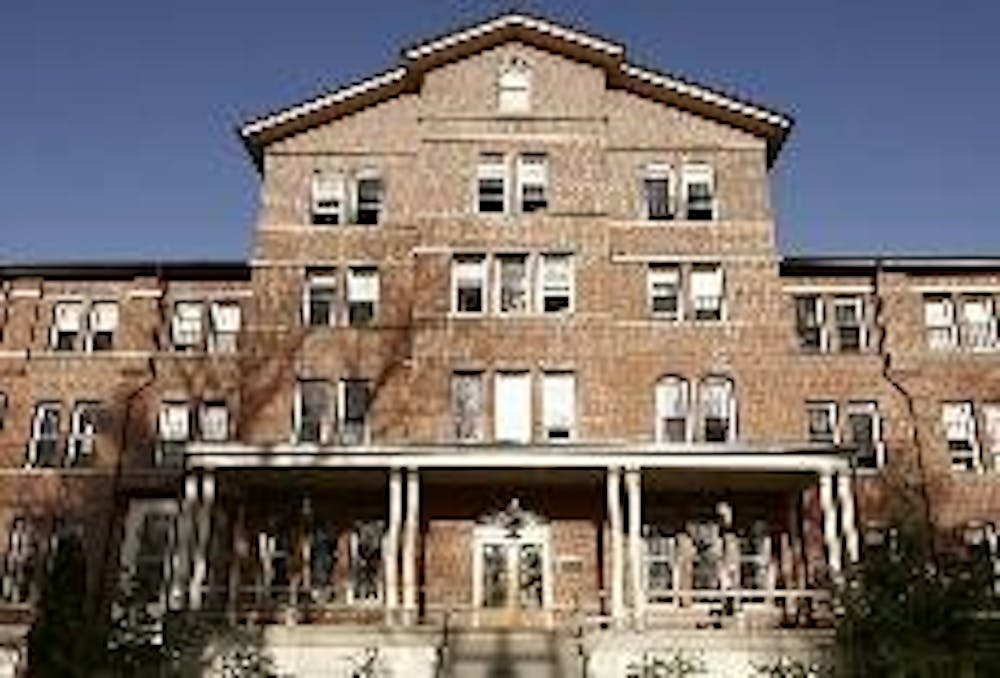
The ad hoc committee analyzing the future of Western College suggested Peabody Hall remain a living-learning community for the program. (Michael Pickering)
Recommendations provided by a university senate ad hoc committee regarding the future of Miami University's Western College Program (WCP) and the possible establishment of a Miami University Honors College are now available for public comment.
The committee, led by philosophy professor Rick Momeyer, will hold three open hearings during the first week of October to provide students, faculty and other interested parties with a chance to comment on the possible recommendations.
However, the Oct. 6 meeting will be set aside for student testimonies only.
Miami University senate created the ad hoc committee following the elimination of the School of Interdisciplinary Studies because a majority of senators were dissatisfied with the process by which the suggestion for removal made its way to the Board of Trustees.
The Board of Trustees voted in July to eliminate the program in concurrence with both Provost Jeffrey Herbst and former President James Garland's recommendations.
The Momeyer committee has met since this past summer and will be making their final report after the open sessions.
"We have less than two weeks to sift through all this material and distill out specific recommendations," Momeyer said. "The report is due to be submitted to senate members on Oct 23."
By the end of fall semester, university senate will make recommendations to the provost, president and trustees about both the Honors and Scholars Program and Western.
However, the ad hoc committee does believe that the WCP should not be merged with the Honors and Scholars Program.
They said that while the programs show similarities, they are ultimately different because students elect to join the WCP on the basis of academic interest, while students of the Honors and Scholars Program are selected on the basis of academic achievement.
Enjoy what you're reading?
Signup for our newsletter
"It's no more appropriate for honors to absorb an academic program such as Western as it would be for them to absorb (a program such as) history," Momeyer said. "People go to history class because they're interested in history."
Besides the open hearings, the public also will have the chance to respond by posting on the committee's Internet discussion board or by privately e-mailing the committee.
The committee has met since July to formulate a list of recommendations for the future of the WCP and the Honors and Scholars Program.
"What we're hoping to hear is some enthusiasm for a particular combination of these recommendations and what people think would be the best configuration," Momeyer said.
The recommendations include having an interdisciplinary core curriculum concentrated in the first two years of the program, a residential living-learning community based in Peabody Hall, a self-designed major and senior project, and preserving the name of "Western."
Kate Guiler, a student committee member and chair of the Honors and Scholars Advisory Board, said that the WCP's strong history and traditions were immediately considered when deciding its future.
"One of the first steps we took was to talk about Western's values and to read historical documents and past reports on Western," Guiler said. "We came up with a list of 'non-negotiables,' that no matter what program we end up with, we want to preserve what makes Western unique to the Miami community."
While key features of the WCP will be maintained in the recommendations, the committee also is also addressing problems with the current program, such as its relative inaccessibility to non-WCP students.
Momeyer said that program inaccessibility exists when non-Western students choose to take Western classes and the classes do not readily satisfy Miami Plan foundation courses.
However, if the WCP's location is moved to the College of Arts and Sciences (CAS), Momeyer believes that non-Western majors will be more likely to take Western classes.
"If the curriculum for the WCP can be restructured in cooperation with the Liberal Education Council and the curriculum entity of the CAS, it should better satisfy requirements on a course-by-course basis as well as a package," Momeyer said. "With all the liberal education requirement students have, it would be a much more appealing program for students."
The committee's vision of a two-year Western program aims to appeal to incoming students who have an interest in interdisciplinary studies and also to those who are undeclared.
"We hope it won't attract students who just want an easy preprogrammed way to satisfy requirements," Momeyer said. "But as Western has done in the past, we hope it would appeal to people who want to take a few more risks with their education and don't mind the increased expectation of their independence."
In addition, the committee addressed the current WCP faculty and whether they will continue to hold continuing appointments with the university, and if so, for how long.
One recommendation would create core faculty within the WCP program who also hold appointments within another department or program at Miami.
The committee also believes that the decision on whether the Honors and Scholars Program will become an Honors College should not be made until the program undergoes a thorough and rigorous review.
"The question about honors is a good, less urgent (question) than the question on the WCP," Momeyer said.
He believes a quick decision on the WCP is necessary so a curriculum committee has enough time to devise a new program and market it to the incoming students of 2008.
"We need to know how Western will be restructured, how it will be staffed, and where it will be located," he said. "That's the issue that's consumed us and that's the most important one."




